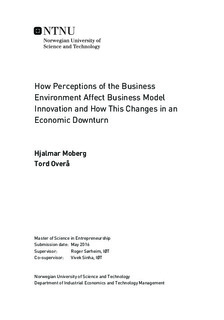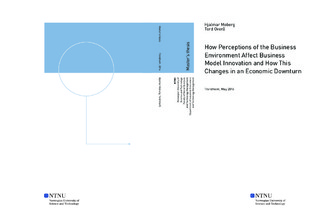| dc.description.abstract | Over the past decades, business models has become an increasing area of focus for both academics and practitioners to determine how to create and capture value for a company. Business Model Innovation (BMI) has been studied as a means to achieve competitive advantage and there is an increasing consensus that BMI is key to firm performance. However, literature describing what triggers BMI is scarce. The authors find the topic interesting through both authors background in academical and professional entrepreneurship, and more precisely their personal interest in the competitive advantage a superior business model in itself can create. This master thesis is divided into two articles, where the first studies what triggers BMI, and the second seeks to investigate how decision-makers perception of the business environment affect their focus on BMI. Together, these two articles aim to lay the foundation on which future research can build to understand why some companies are more successful in innovating their business model than others, and through this cause awareness among practitioners of what might limit their BMI efforts.
The first article investigates what triggers BMI in New Ventures compared to Established Companies, and how an economic downturn affects these triggers. New Ventures and Established companies have different perceptions of their environment, and will likely perceive triggers of BMI differently, giving different implications for entrepreneurs in New Ventures and managers in Established Companies. Further, the changing environment an economic downturn causes is interesting to study, as BMI and environmental change are closely related. The findings show that most BMI triggers originate from external sources outside the focal company, changing one or more of the business model components, and that the internal composition of resources and capabilities in a firm determines how and which BMI triggers it perceives. Further, the authors find that an economic downturn is likely to amplify these triggers, due to fluctuations in the firm s environment and changes in the value of resources and dynamic capabilities. Lastly, our literature review suggests that Established Companies are more receptive to BMI triggers in a stable economic environment, while New Ventures are more so during an economic downturn. The findings are particularly interesting for managers and entrepreneurs operating in rapidly changing markets, that require constant scanning of the environment to stay competitive through their business model.
In light of the first article, the second article investigates how the BMI focus of entrepreneurs in New Ventures and managers in Established Companies is affected by their perception of the business environment, and how an economic downturn affects these perceptions. By analysing how four metrics of perception affect three metrics of BMI, the authors conclude that perceptions have a substantial effect on BMI actions. Specifically, it is found that a high level of perceived dynamism in a firm's environment leads to a high level of BMI. It was also found that a broad position in the value chain and being positioned close to the end customer leads to more BMI, as these companies are able to perceive and respond to signals of change better. Finally, the theoretical implication that New Ventures will perform more BMI than Established Companies in an economic downturn is confirmed, though under the condition of the mentioned perceptions, as only some of the New Ventures perform a lot of BMI. This has important implications for business model practitioners, who should take into consideration how their current subjective perception affects how they navigate their company in an objective environment. From an academic standpoint, the two articles in combination lays a foundation for further research on the relation between the business environment and BMI. | |

